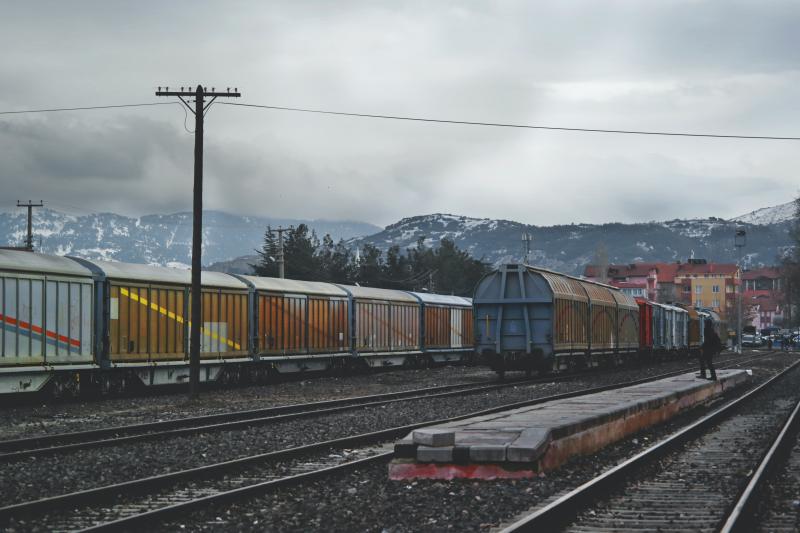Rail transport is one of the most cost-effective freight methods currently available. Commercial rails can carry large amounts of freight across long distances, giving it a lower cost-per-ton-mile than truck shipping. However, carrying so much freight across such a long distance makes it that much more disastrous if a freight train derails.
Ductile Iron for the Rail Industry
Ductile iron's unique traits make it well-suited to a variety of locomotive components. Some of the more common ones include:
Railcar Connectors
Railcar connectors are under constant stress for extended periods. As a result, they need to be durable enough to withstand the weight of their connected cars, as well as the constant vibrations and friction that come from railroad travel. Ductile iron's flexible, durable nature makes it a perfect fit for this role; as a result, railcar connectors are its most common railroad application. While traditional ductile iron is well-suited to this, austempered ductile iron (ADI) casting is the best choice due to its increased strength and wear resistance.
Brake Fittings
Brakes are often the only thing standing between a locomotive and derailment. Because locomotives can weigh over 640 metric tons, stopping them creates an enormous amount of friction and heat. ADI casting translates to enhanced durability, making it a perfect fit for locomotive brake castings; it is capable of handling this friction and change in temperature without warping or cracking.
Suspension Components
A suspension system helps a vehicle travel smoothly, even if the terrain is uneven. Ductile iron springs feature a high compression strength and help to dampen vibrations, making them excellent shock absorbers. An efficient suspension system means a smooth journey, which lessens vibrations throughout the train and reduces strain on other components. This means that a ductile iron suspension system not only does its job well — it lengthens the lifespan of other components.
Top Caps, Housings, and Safety-Critical Parts
Urick specializes in the casting of safety-critical parts such as top caps and housings, which are essential for the efficient operation of rail transport systems. These components work together to create balancing mechanisms on trains, ensuring railcars remain stable and aligned – preventing derailments like the East Palestine incident from happening. The flexible nodule structure of ductile iron makes it an ideal material for these applications, combining strength and flexibility to absorb and dissipate immense forces, reducing the risk of failures.
Ductile iron's nodular graphite structure allows it to deform slightly under stress without cracking, which is crucial for absorbing shocks and vibrations. This unique combination of properties ensures that top caps and housings effectively maintain railcar alignment and stability, significantly reducing the risk of derailments.
Our top caps and housings are used in various rail systems worldwide, providing reliable performance in challenging environments — from high-speed passenger trains to heavy freight carriers. We build long-term partnerships with our clients, developing solutions that meet current needs and anticipate future challenges. For more information on our safety-critical parts and how they can benefit your rail operations, please contact us. We are here to help you achieve the highest standards of safety and performance in the rail transport industry!
What Causes a Train to Derail?
There are numerous reasons that trains can malfunction, many related to part failure. Below are the most common ones, along with advice on how to avoid train derailments when they occur:
Track Component Errors
In track component failure, a part of the track breaks down and causes the train to derail when it drives over it. These errors can include broken trail rails, rusting, and cracks. To avoid this, the tracks have to be carefully monitored for damage and fixed when necessary. However, considering train tracks can span thousands of miles, it's more efficient to use suitable materials during construction to minimize wear and tear.
Failure of Running Gear
Running gear failure occurs when parts of the train itself break down. This includes unlubricated wheels wearing down due to friction, railcar connectors snapping, and brakes wearing down from repeated use. If a part fails while the train is in motion, it can easily lead to derailment; to avoid this, it's crucial to perform routine maintenance and replace any worn-down locomotive components.
Unusual Track and Rail Interaction
Unusual interaction is when tracks or rails are unexpectedly affected by outside conditions. For example, hot weather can cause the rails to expand, which can force the vehicle to buckle. To prevent this, the rails and tracks must be made to suit the environment they're laid in and tracked carefully during any unusual weather changes.
Qualities of Ductile Iron
A crucial part of preventing derailments is making sure your locomotive parts are reliable. To do so, you need a reliable material — in this case, ductile iron.
Freight trains are enormous and heavy, and regularly travel thousands of miles, putting their parts under immense strain over extended periods. Ductile iron is both stronger and more flexible than traditional iron, meaning that it's able to endure repeated, intense stress without breaking or changing shape. With the versatility of ductile iron casting, you can easily cast shapes with very narrow allowance margins, making them suitable for any job specification.
ADI casting goes a step further than its standard ductile counterpart, employing a heat-treating process to gain even more toughness and tensile strength. Because austempering is an isothermal process, it doesn't put the metal at risk for distortion and cracking like other heat treatments. ADI casting is often used for locomotive components due to its enhanced strength and durability.
Stay on Track with Urick Ductile Solutions
It's important to have complete faith in your iron, especially when it's guiding a train. Urick Ductile Solutions provides high-quality ductile iron cast to ASTM A536 specifications, guaranteeing strong, flexible iron at a lower cost than steel.



